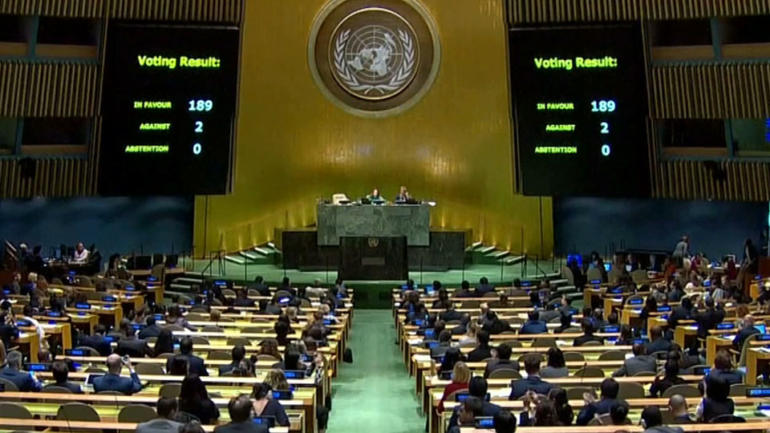The United Nations General Assembly calling on the U.S. – again- to end its embargo on Cuba. It’s the 27th time that most U.N. members have voted in favor of the resolution. The U.S. is calling it ‘a waste of time’. CGTN’s Liling Tan has details.
By a vote of 189 countries in favor, with just the U.S. and Israel against, and Ukraine and Moldova abstaining, the U.N. General Assembly has passed yet another resolution condemning the U.S. blockade of Cuba. This sends a clear message to Washington that an overwhelming majority of nations still believe the U.S. policy on Cuba is outdated, unjust and unnecessary, and the blockade should end.
Those were the words from one country after another over these two days — from the European Union to the Africa Group of nations to the Group of 77 plus China, when they explained their votes. Many also noted that the embargo violates human rights and the dignity of the Cuban people, prevents Cuba’s development and hinders its trade with other nations.
In what some U.S. critics say was an attempt to delay the vote and deflect criticism, Washington had proposed eight amendments to the draft resolution, calling into question Cuba’s human rights record, and demanding, among other things, that Havana lift restrictions on freedom of expression and assembly. The General Assembly had to vote on each of those amendments before they could decide on the resolution. But the U.S. amendments were defeated and the resolution was adopted, followed by loud applause from the General Assembly Hall. U.S. Ambassador Nikki Haley was not happy, saying,”the United Nations has lost.”
It’s only the latest incarnation of a resolution the Assembly first passed in 1992, and it’s not likely to be any more effective. The vote is not legally binding, like a vote would be from the Security Council. However, it does put Washington in the spotlight as standing apart from the rest of the world on this key issue, at a time when it is already under scrutiny for disengaging from multilateralism, and international consensus.
 CGTN America
CGTN America

